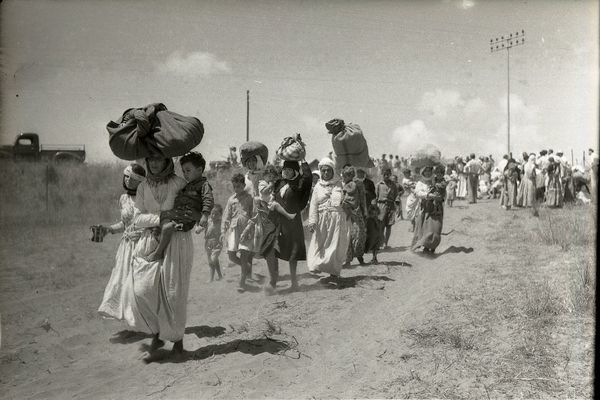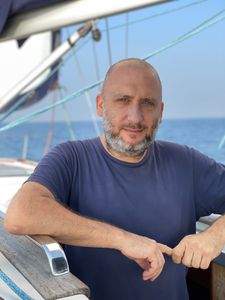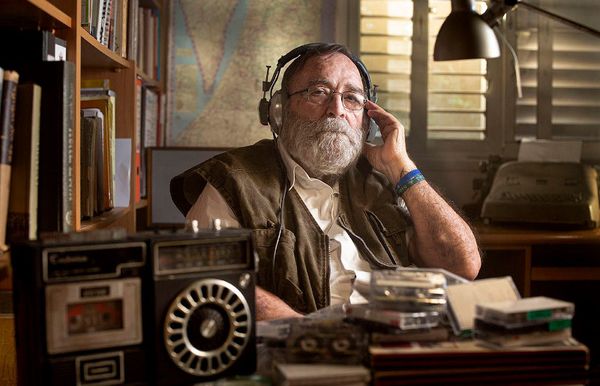Amber Wilkinson: When you were speaking to Teddy Katz about this, and he was telling you that he had these tapes. You can see in the film it obviously came as quite a revelation to you they were there. When he warned you about the pressure you might face if you picked this up, what did you think at the time?
Alon Schwarz: I was more focused on the fact that he gave me those tapes and as a documentary filmmaker, that doesn't happen to you a lot of times in life, that you come to a person and get it, just like that. So that was shocking. So I didn't give it much attention. Later in the editing room, we noticed.
AW: He was probably quite relieved that somebody was taking him seriously. I mean, as the film shows, it must have been a pretty terrible 20 years for him because of this.
AS: Yeah. 23 years, I think. Teddy Katz said this a couple of times to me. He said: “My life is split between the period before Tantura and after Tantura. For him ‘Tantura’ is the affair, of course, of the trial. So yeah, his life has totally changed. You know, it's ruined his life, basically.
AW: When you took those tapes did it not initially feel a bit overwhelming to just have so much material just handed to you like that? Documentarians generally get it a bit at a time, right? You don't get 100 hours like that.
AS: More than 100 hours. The first thing I did was start digitising this. And then we started listening. I don't understand Arabic so I had somebody listen to the Arabic and I and another researcher listened to the Hebrew. It’s not that every minute of the tape they admit. Teddy Katz would come to them and they’d talk to him for an hour and a half or two and each, not all of them, but each one of them has a point where he says something and then says another thing. It's really fascinating because some of them realise in real-time that they said something they didn't want to say. And then the whole intonation changes, the whole conversation changes. It's not in the film, you can’t give that in a film, but for me as a researcher to eavesdrop on these scenarios that happened 23 years before and to realise the psychology - and we have the web and I can instantly research who the person was - I had all the data. It's like sitting like God and understanding when the person's lying and when he's not.
I think it’s something that they didn't have at the time when they investigated this, and you know, there were people who were for him and against them, but they didn't have the level of technology that we have today to do everything digital and to listen to everything. Some of the things were not audible, we had to improve them. And that was super interesting. And especially the psychology of the people sitting there and their intonation, which is very important.
 |
| Alon Schwarz: 'Obviously, the trauma of people who had people killed in their families is huge, but this is also trauma of the perpetrators' Photo: Courtesy of Sundance Institute |
Nobody wrote about this yet, I think, that all the people who investigated this used transcripts, they gave it out to a minimum-wage third party, they got transcripts. There's no intonation, there's no little things. When they [the former soldiers] admit, they mumble sometimes, and when you listen to the mumble, you get it. And this is what's so strong about listening and this is what the court doesn't really do because they use transcripts, in general. And that's what I understood very early on. I read Teddy Katz’s report at a very late stage. I come from the from the technology world so I said: “This is my data. This is raw data and I'm going to use my intelligence and my logic to listen myself to the raw data. I don't want to be affected by Teddy's work or by the transcripts or by the court case, and the academics.” And that's how I came to it.
AW: Although you say it's not in the film, I would argue that it is in the film, in the sense that when you go and re-interview some of these people, or speak to others who were involved at the time, you do see all of that sort of dissembling. The film is very interesting about this idea of denial.
AS: You see it in their body language in the modern footage that I took. What I meant is that you can hear it in the tapes. They’re happy and friendly and then they say something, you know, ‘We shot them in the barrels’, and then the whole thing changes and for an hour they do small talk. But you see the same thing, you’re right, in the videos that I shot of these men and you get it, you get the same thing.
AW: Ultimately you're working up to the idea of national denial, and to what extent a state's denial filters down to the everyday denial among their people and how that can occur. But it's interesting to see how even now, some of these people, even if they're saying something terrible, they are obviously in denial about it, because you know, he's talking about being a murderer, and he's laughing. So clearly, there's an internal denial still in operation.
AS: I think it's more than denial. In many cases, it's embarrassment. You know, these people are embarrassed. Most of these people, except one who admits it, were not murderers. But they did witness it, and they did shut up because that's what soldiers often do. They don't snitch. Obviously, the trauma of people who had people killed in their families is huge, but this is also trauma of the perpetrators. And that's what's so strong about this film that that you see a trauma of 90- year-olds. People ask me, ‘Are they psychopaths?’ No they’re not. In the beginning, when they sit down, there's a scene that I love. You hear the tapes, they're sitting down and they're not listening yet, they're going to listen. Teddy says, ‘Are they murderers? No, they're normal people.’ It’s very strong that you realise that they're normal people. That's exactly what's strong there.
AW: Correct me if I'm wrong but the whole point is that normal people can do very bad things in the wrong circumstances. And the lack of acknowledgement of that can obviously grow through a period into almost a worse situation in a way.
AS: In every war there are cases like this. Most of them, you never hear about. This happens every year around the world, with the most moral armies, western or eastern, or whatever. I mean, the US did this, the Brits did this, the French did this. The Europeans did this, of course, the Russians, Chinese - it happens all over the world.
AW: In the case of this film, I feel like you're making a particular case that Israel feels very strongly about maintaining the highest of moral high grounds over this issue.
AS: The issue is that Israel, because of its unique history, is a nation in trauma to this day, that's the truth. People are in trauma and people are afraid we're going to get killed and they have a good reason to say that - we haven't had a quiet day since the founding of the state. And this trauma leads to a very strong denial of our founding and of this year, 1948. What I do is very hard to do in Israel. It's frightening. I've lost a lot of sleep over the past two years worrying about what will happen in these moments and what will happen in the next weeks and months. Because it's scary, because it's not popular. And because it is a taboo. It doesn't mean that there aren’t news stories. People wrote about in the 80s when the archives opened but that that precipitated it to the intellectuals - how many read those books? But I think in the last two or three years, and this film is a huge step, there have been several other works [on the subject]. I'll give you an example.
 |
| Director Alon Schwarz: 'What I do is very hard to do in Israel. It's frightening' |
AW: Are the political changes at the top having an impact?
AS: That's a huge thing. Listen, the biggest achievement of our former prime minister [Benjamin Netanyahu], who I truly don't like, and that is a very big understatement, is his lying and deceiving. He caused Israel to have a political black hole, an explosion. A right wing prime minister is sitting with a Muslim, Islamic party member, and they're sitting together and, and it's normality finally, it's never happened in Israel. It's much more easy to speak now and I think part of it is because we have Muslims in our government. And that's great.
AW: You sort of lay the past on the present by filming some of your interviewees, listening to some of those testimonies Katz recorded. When did you decide that that was something you were going to do?
AS: Very early on. We knew we would have audio from the tapes. And that's a major thing. There's a you know, you can there's a limit to how many times you could put in a tape - you know, the visual. It works, it's nice, it's cinematic, but then you want more and then we realised that, one, it would be wonderful to have them listen, to cover it, but two, it's not only covering, their reactions are priceless. What it doesn't is makes them speak, because not all of them wanted to speak. And when they hear others, they're humans and they react.
AW: How has the film gone down back home so far, how do you think it will be received?
AS: A lot of people will say I'm an anti-Zionist, I’m anti-Israeli, these old people, they'll say everything, all the usual arguments - “It was war, they killed us more.” Look, it was war. It was a survival war. I don't know if I would have done things better, if I was living back then, I can’t judge. I can’t judge history from today's perspective, this is very clear. But I can say that they knew that they shouldn't have killed civilians after a battle ended. And even if it wasn't a command from above, this is what happened in this place and it's happened in other places as well, it's clear to us today. And we have to say sorry for our part. It doesn't mean that we're going to leave Israel and now give all of Israel to the Palestinians. Israelis have this fear that if we admit this, we don't have a right to this land. And we do have a right to this land.
The Jews have a right, they were massacred people more than any other people in the modern age. And I'm a Zionist - I want you to write this. I believe in that. I don't think Zionism is a curse. I don't think Zionism is a curse, I think Zionism was kidnapped by right-wing people. And I think that, that Zionism, did have ideals, and did have good intentions. And the plan went wrong in several steps in history. And I think it can be fixed. I think if we have a two-state solution at some point, which everybody doesn't talk about any more, it's a mutual recognition, real recognition, where we also recognise them for real, that path that can help us have a better future. And that's why I made the movie.
AW: There are hopeful things in the film but it feels quite sad to me that you still have a lady basically saying, well, if the Palestinians want it, then it's harming me. How do you get past that?
AS: I'll tell you something. I don't know that we will do it but I hope that a new generation will come. A lot of the younger generation is also full of hate and fear much worse than the old generation, that’s the truth. But there's also young people on the left side who understand what this movie is talking about and who write to me, “Thank you for showing this to us.” And I think there's real hope in the new generation. And I think the Zionist left in Israel, which is not half but quite still quite a lot of people, if they recognise, and they come forward and they say, “We're not giving away our land, but we are apologising for our part, the Palestinians can apologise for other stuff, but we threw them out and we acknowledge this historical fact.” It will help. I think most of the Palestinians will like that. And I think it's the first step. It's not the solution, but it's the first step and I think will happen.
Beyond talk of the headline news of a mass grave and, and murder and massacre, I think what's important to say and to talk about is that this is a portrait of Israeli society – and its founding myth. I brought the world a portrait - an inside look at our deep fears. This is a portrait of Israeli society and its founding myth. This is for me the subtitle of the film. In all the media, they take the sensations as expected, but I think it's a portrait of Israel society and it's interesting because of that.























